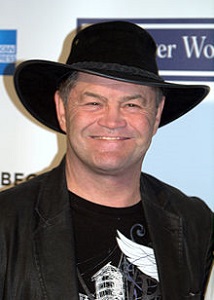![]()
![]()
Recommended Reading
from Bruce
HENRY ROLLINS: WHY DO THE OLD HEADS ROCK HARDER THAN THE YOUNGBLOODS? (LA Weekly)
Those who pushed themselves through that which broke so many others in those days might not understand any other way to hit it. Perhaps their different style of playing is a manifestation of some kind of post-traumatic stress, or a refusal to go quietly. Whatever it was, there was a huge difference. I will never wonder why people will still be talking about Gordon, Mould, Brannon and Watt years from now.
HENRY ROLLINS: NOT EVERYONE IS CUT OUT TO BE A NEW YORKER - INCLUDING ME (LA Weekly)
I have been here almost a week now and that's the part that came back to me the fastest: There is hardly any room here. The humanity is so densely packed that you must surrender to almost every setting being cramped and high-volume. Restaurants are deafening with music, laughter and voices. People stand face to face and shout in conversation. It's great, but being here is a high-calorie burn, and not everyone is cut out to be a New Yorker.
Dana Stevens: The Hateful Eight (Slate)
Quentin Tarantino's eighth film is bold, gorgeous, verbally clever, and possibly evil.
Peter Bradshaw: "The Hateful Eight review: Agatha Christie with gags, guns and Samuel L Jackson" (The Guardian)
A blood-splattered murder mystery in 19th-century Wyoming is the notional plot for Tarantino's swaggering off-message and old-fashioned three-hour masterpiece.
Sharan Shetty: Quentin Tarantino Wanted to Hate Mad Max, His Favorite Film of 2015 (Slate)
Every now and then, when not giving contradictory lists of his favorite films of all time, Quentin Tarantino reveals his favorite film of the year. He did it in 2010 (Toy Story 3); he did it in 2011 (Midnight in Paris); he did it in 2013 (Big Bad Wolves).
Christina Cauterucci: How Did America Get So "Pussified"? (Slate)
Everyone knows America has been going down the tubes for years-decades, actually. Generations, even. But what if, all along, those tubes have been Fallopian?
David Bruce's Amazon Author Page
David Bruce's Smashwords Page
David Bruce's Blog
David Bruce's Lulu Storefront
David Bruce's Apple iBookstore
David Bruce has over 80 Kindle books on Amazon.com.

 wrote:
wrote:












 answered:
answered:


Reader Suggestion
Michelle in AZ

Reader Comment
naughty list

Gary in PA
Thanks, Gary!

from Marc Perkel
Patriot Act



Selected Readings
from that Mad Cat, JD
HI EVERYBODY. I'M MOVING!
THE COMPUTER WILL BE DOWN FOR AWHILE STARTING TODAY. I'LL BE BACK WHEN I GET IT UP AND RUNNING, WHICH MAY TAKE A WHILE.
I WISH EVERYONE PEACE AND LOVE AND A HAPPY, PROSPEROUS NEW YEAR.
JD


Visit JD's site - Kitty Litter Music
In The Chaos Household
Last Night
The colder weather is messing with the Passiflora - the only plant my Gulf Fritillary butterflies eat.
With the lack of rain (and the fence incident), the plants didn't do very well last summer and the remaining caterpillars nibbled what was left down to the stems, and the plants withered and died.
Had a hard time finding replacement plants, but came across some a few weeks back.
Guess I should have left them in the buckets instead of putting them in the ground. At least then I could moved them onto the patio or in to the garage. Sigh.
OTOH, have a couple on back order, so all may not be lost - just expensive.

Give $1Million For Syrian Refugees
Cohen & Fisher
British comedian Sacha Baron Cohen and his wife are donating $1 million (900,000 euros) to help Syrian refugees, the charities receiving the money announced Sunday.
The "Borat" star and actress wife Isla Fisher are giving $500,000 to Save the Children to pay for measles vaccinations for children in northern Syria.
They are also donating the same amount to the International Rescue Committee (IRC) to help refugees in Syria and neighbouring countries, particularly women and children, with health care, shelter and sanitation.
Cohen & Fisher

Chinese Medicinal Herbs
US Farmers
Expanding interest in traditional Chinese medicine in the United States is fostering a potentially lucrative new niche market for farmers who plant the varieties of herbs, flowers and trees sought by practitioners.
While almost all practitioners still rely on imports from China, dwindling wild stands there, as well as quality and safety concerns, could drive up demand for herbs grown in the U.S. Several states have set up "growing groups" to help farmers establish trial stands of the most popular plants.
"As a farmer, I love the idea of growing something no one else is growing, something that's good for people," said Rebekah Rice of Delmar, near Albany, who is among 30 members of a New York growing group. "This project is seriously fascinating."
Traditional Chinese medicine is gaining mainstream acceptance in the U.S. There are 30,000 licensed practitioners across the country - 46 states issue licenses, often requiring a master's degree and continuing education credits. In 2014, the Cleveland Clinic opened one of the first hospital-based Chinese herbal therapy clinics in the country.
Using an economic development grant from the Tobacco Region Revitalization Commission, the Blue Ridge Center is enlisting local farmers to grow medicinal herbs that the center will process and sell to licensed practitioners. This year, the center planted 38 species on 35 farms.
US Farmers
May Get Funds
Coast Guard Museum
Supporters of the first national museum honoring the U.S. Coast Guard hope newly passed federal legislation will provide a financial lift to the long-awaited project planned along Connecticut's waterfront.
The Senate this month approved the Coast Guard Authorization Act, which includes language expanding the amount of support the Coast Guard can provide to develop and install museum exhibits and displays of the service's artifacts. The bill already cleared the House of Representatives and now awaits President Barack Obama's signature.
Sen. Richard Blumenthal has been working with Rep. Joe Courtney, a fellow Connecticut Democrat, to change current federal law, which greatly limits how much the Coast Guard can financially support the project planned for downtown New London. He said he's been concerned about whether enough funds will be eventually raised for the project and believes this change, if signed into law, will prompt more private donations.
The capital campaign for the planned $100 million museum, a figure that includes a $20 million pedestrian bridge over railroad tracks and other Americans with Disabilities Act requirements, has been a three-pronged approach. It includes obtaining $20 million from the state, which already has been promised; up to $30 million from the federal government; and the remaining $50 million from private donations, said Wes Pulver, executive director of the museum and a retired captain of the Coast Guard Barque Eagle.
The museum has received private commitments worth $1.754 million from some of the 300 companies associated with the American Waterways Operators, a national advocate for the U.S. tugboat, towboat and barge industry. More money is expected.
Coast Guard Museum

What Climate Change?
Alaska
Alaska Inuit hunter John Goodwin for decades has hunted oogruk, the bearded seal, a marine mammal prized for its meat, oil and hide.
The largest of Alaska's ice seals uses sea ice to rest and birth pups, and after the long winter, when ice breaks into floes, there's a window of opportunity for Goodwin to leave his home in Kotzebue and motor his boat between ice panels, shoot seals and butcher them before they migrate north through the Bering Strait.
A hunting season that used to last weeks, however, has shrunk. Ice that formerly froze 5-feet thick or more is a fraction of that. Ice disappears quickly, and so do the seals.
The environment is changing and the Inuit, who consider themselves a part of it, want measures taken to protect their culture. A report issued this month by the Inuit Circumpolar Council-Alaska, which advocates for Inuit coast villages from southwest to north Alaska, calls for policies that protect Inuit traditional food and the Arctic environment that produces it.
For the Inuit, who have survived for thousands of years in one of the harshest climates on Earth, food is the connection between the past and today's culture, according to the report.
Alaska
Ministers Approve New Restrictions
Israel
Israeli Cabinet ministers on Sunday gave preliminary approval to a bill that imposes new disclosure requirements on nonprofit groups that receive foreign funding - drawing accusations it is cracking down on pro-peace groups, rattling relations with Europe and deepening an increasingly toxic divide between liberal and hawkish Israelis.
Critics said the regulations are meant to stifle dovish organizations critical of Prime Minister Benjamin Netanyahu's government policies toward the Palestinians, since such nonprofits tend to rely heavily on donations from European countries.
In contrast, pro-government and nationalistic nonprofit groups tend to rely on wealthy private donors, who are exempt from the measures under the bill. The legislature is expected to approve the bill as early as this week.
Opposition leader Isaac Herzog quickly blasted the bill as a "muzzling law" that would bring about "thought police."
The bill requires organizations that receive more than half of their funds from a foreign government or entity to declare their sources of funding in reports and parliamentary discussions. Their activists also will be required to wear special tags when working in Israel's parliament.
Israel

Sinking Land Costing Billions
California
A canal that delivers vital water supplies from Northern California to Southern California is sinking in places. So are stretches of a riverbed undergoing historic restoration. On farms, well casings pop up like mushrooms as the ground around them drops.
Four years of drought and heavy reliance on pumping of groundwater have made the land sink faster than ever up and down the Central Valley, requiring repairs to infrastructure that experts say are costing billions of dollars.
This slow-motion land subsidence - more than one foot a year in some places - is not expected to stop anytime soon, experts say, nor will the expensive repairs.
Land subsidence is largely the result of pumping water from the ground. As aquifers are depleted, the ground sags.
The most severe examples today are in San Joaquin Valley, where the U.S. Geological Survey in 1975 said half of the land is prone to sinking. USGS researchers later called it one of the "single largest alterations of the land surface attributed to humankind."
California

Returns To German Market
'Mein Kampf'
For 70 years since the Nazi defeat in World War II, copyright law has been used in Germany to prohibit the publication of "Mein Kampf" - the notorious anti-Semitic tome in which Adolf Hitler set out his ideology.
That will change next month when a new edition with critical commentary, the product of several years' work by a publicly funded institute, hits the shelves.
While historians say it could help fill a gap in Germans' knowledge of the era, Jewish groups are wary and German authorities are making it clear that they still won't tolerate any new "Mein Kampf" without annotations.
Under German law, a copyright expires at the end of the year 70 years after an author's death - in this case, Hitler's April 30, 1945, suicide in a Berlin bunker as the Soviet army closed in. That means Bavaria's state finance ministry, which holds the copyright, can no longer use it to prevent the work's publication beyond Dec. 31.
'Mein Kampf'

Opens Vichy-Era Archives
France
France will throw open access to police and legal archives drawn from one of the country's darkest hours, when the Vichy regime collaborated with Nazi occupiers during World War II, authorities said Sunday.
Starting Monday the archives can be "freely consulted" by the civil service, citizens and researchers "subject to the declassification of documents covered by national defence secrecy rules," according to a decree.
The Vichy regime, led by World War I hero Philippe Petain, collaborated with the invading German army from 1940-1944.
The archives include documents from the foreign, justice and interior ministries as well as from France's provisional government after liberation.
Documents dating from as late as December 31, 1960 are also covered by the new rule, as long as the files relate to matters that happened between September 1939 and May 1945.
France

Weekend Box Office
"Star Wars: The Force Awakens"
"Star Wars: The Force Awakens" has reached $1 billion at the box office, achieving the milestone with record-setting hyper speed.
The Walt Disney Co. said "The Force Awakens" crossed the billion-dollar mark Sunday, accomplishing the feat in just 12 days. The previous movie to reach $1 billion the fastest was Universal's "Jurassic World," which did it in 13 days in June. "Jurassic World" also had the benefit of record grosses in China. "The Force Awakens" doesn't open in the world's second-largest movie market until Jan. 9.
A flurry of new films also opened in the top 10 this weekend. "Concussion," the Will Smith-NFL drama, took in $11 million, good for sixth place, followed by the financial-crisis saga "The Big Short," which collected $10.5 million. The remake of "Point Break" opened with $10.2 million. And Quentin Tarantino's latest film, "The Hateful Eight," debuted in 10th place with $4.5 million.
Estimated ticket sales for Friday through Sunday at U.S. and Canadian theaters, according to Rentrak. Where available, the latest international numbers for Friday through Sunday are also included. Final domestic figures will be released Monday.
1. "Star Wars: The Force Awakens," $153.5 million ($133.3 international).
2. "Daddy's Home," $38.8 million ($4.4 million).
3. "Joy," $17.5 million ($2 million international).
4. "Sisters," $13.9 million ($300,000 international).
5. "Alvin and the Chipmunks: The Road Chip," $12.7 million ($8.1 million international).
6. "Concussion," $11 million.
7. "The Big Short," $10.5 million ($1.4 million international).
8. "Point Break," $10.2 million ($2 million).
9. "The Hunger Games: Mockingjay-Part 2," $5.3 million ($6.4 million).
10. "The Hateful Eight," $4.5 million.
"Star Wars: The Force Awakens"
In Memory
Haskell Wexler
Haskell Wexler, one of Hollywood's most famous and honored cinematographers and one whose innovative approach helped him win Oscars for "Who's Afraid of Virginia Woolf?" and the Woody Guthrie biopic "Bound for Glory," died Sunday. He was 93.
Wexler died peacefully in his sleep, his son, Oscar-nominated sound man Jeff Wexler, told The Associated Press.
A liberal activist, Wexler photographed some of the most socially relevant and influential films of the 1960s and 1970s, including the Jane Fonda-Jon Voight anti-war classic, "Coming Home," the Sidney Poitier-Rod Steiger racial drama "In the Heat of the Night" and the Oscar-winning adaptation of Ken Kesey's "One Flew Over the Cuckoo's Nest."
He was also the rare cinematographer known enough to the general public to receive a star on Hollywood's Walk of Fame.
"He was a wonderful father. I owe most of who I am to his wisdom and guidance," said his son, nominated for Oscars himself for "Independence Day" and "The Last Samurai."
When the elder Wexler wasn't working on big-budget studio fare, he traveled the world directing and photographing documentaries for favorite causes.
His 1969 "Medium Cool" mixed documentary and dramatic elements, telling the story of a fictional television photographer (Robert Forster) who covers the violence between Chicago police and protesters at the 1968 Democratic National Convention. The real-life unrest was filmed on the spot for the movie, and its "cinema verite" approach was closely studied by aspiring filmmakers.
For "Who's Afraid of Virginia Woolf," the last film to receive an Oscar for best black and white cinematography, he used hand-held cameras to capture the tension of the tirades between Elizabeth Taylor and Richard Burton. For "In the Heat of the Night," he put silks over the tops of sets and aimed lights at their centers. His aim was to contribute to the tension between Poitier's big-city black detective and Steiger's Southern white lawman.
As visual consultant on George Lucas' "American Graffiti," he hosed down the streets to achieve a moody, reflective style. He helped give Terence Malick's "Days of Heaven" a hazy, dreamlike atmosphere.
Wexler was also noted for his clashes with directors. Francis Ford Coppola fired him during the filming of "The Conversation." Milos Forman dropped him during the filming of "One Flew Over the Cuckoo's Nest" and Wexler shared the cinematography credit with Bill Butler.
For one of his documentaries, 2006's "Who Needs Sleep?" Wexler turned his attention to the film industry itself, decrying the long hours endured by Hollywood set workers. It was inspired by the death of a worker who fell asleep driving his car after a 19-hour stint on a movie set.
Wexler's other documentaries include: "The Bus," about the Freedom Riders who risked their lives to integrate the South in the 1960s; "Latino," which examined American policy in Nicaragua; "Interviews with My Lai Veterans," which shined a light on survivors of U.S. brutality in Vietnam; and "Brazil: Report on Torture."
Born into a well-to-do Chicago family on Feb. 6, 1922, Wexler was still in grade school when he went to work for a photographer involved in the trade-union movement. At age 12, he recorded his family's vacation in Mussolini's Italy with his family's home-movie camera.
Wexler left the University of California, Berkeley, 18 months into his studies to enlist in the Merchant Marine as the U.S. was about to enter World War II. After his ship was torpedoed off the tip of South Africa, Wexler helped some of the sailors join him in a lifeboat.
Returning to Chicago, he made films for the United Electrical Workers Union before moving to Hollywood in 1960, where he made his feature debut in 1963 on Elia Kazan's immigrant drama "America, America." It brought instant acclaim and steady work.
A photographer on dozens of feature films, dozens more documentaries and scores of TV commercials, Wexler remained active for decades. At age 89, he received an Emmy nomination as the cameraman for Billy Crystal's "61(asterisk)," the HBO film about Roger Maris' record-setting home run season. A few years earlier, Wexler himself was the subject of a documentary, "Tell Them Who You Are," directed by another of his sons, Mark Wexler.
His last film credit, the biopic "To Begin the World Over Again: The Life of Thomas Paine," is in postproduction, according to the Internet Movie Database.
In addition to his sons, Wexler is survived by a daughter, Kathy Wexler, and his wife, Rita Taggart.
Haskell Wexler
In Memory
Dave Henderson
Dave Henderson, the former major league outfielder who hit one of the most famous home runs in postseason history, died Sunday after suffering a massive heart attack. He was 57.
Henderson was best known for his home run in the 1986 AL Championship Series for Boston. With the Red Sox one strike from elimination in Game 5, Henderson hit a two-run homer in the top of the ninth against the California Angels to send the series back to Boston. The Red Sox won Games 6 and 7 to advance to the World Series.
But beyond his memorable playoff moment, Henderson was a reliable contributor to four teams that reached the World Series and played 14 seasons total in the majors. His greatest success came from 1988-91 with Oakland. During that four-year stretch, the A's went to the World Series three times.
Henderson played in 575 regular-season games during that span, hitting .275 with 84 homers, 123 doubles and 322 RBIs. Henderson was an All-Star in 1991.
Henderson began his career in Seattle as the first draft pick in the history of the Mariners franchise in 1977. He made his debut in 1981 and played parts of six seasons with the Mariners. Henderson was traded to Boston during the 1986 season and later played for San Francisco and Kansas City.
After his playing career ended, Henderson spent time as a broadcaster for the Mariners and ran fantasy camps for A's and Mariners fans. He also raised funds to support research of Angelman Syndrome, a genetic disorder that affected his son Chase.
Henderson was born July 21, 1958, in Merced, California. He is survived by sons Chase and Trent, wife Nancy and his first wife, Lori.
Dave Henderson

| CURRENT MOON lunar phases |



